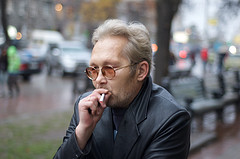Pavel Kutsev, the leader of the Ukrainian organization of people living with drug addiction Drop-in Center recently wrote a blog post advocating for the uniting of efforts by society to fight the HIV/AIDS epidemic.
Ukraine has the worst HIV/AIDS situation in the region and drug injection is the most common way of spreading the infection. According to the UNAIDS Global Report , adult HIV prevalence in Ukraine is higher than in any other European and Central Asian country. Annual HIV diagnoses have more then doubled since 2001. In October 2010, the International HIV/AIDS Alliance in Ukraine reports that the number of injection drug users among all officially registered HIV cases in Ukraine constituted almost 59%.
Substitution therapy programs among injection drug users are aimed at primarily decreasing the spread of HIV infection in this group. Although the central government of Ukraine supports harm reduction programs, there are other sectors in Ukrainian society that are strongly opposed, even to the idea of substitution therapy. In 2009, municipal councils of a few Ukrainian cities banned opiate replacement therapy in municipal hospitals. During the press-conference in June 2010 the Deputy Minister of Internal Affairs (MIA) of Ukraine Mr. Zyma clearly stated that the Ministry did not support use of Methadone in substitution therapy programs. His reasoning was that harm reduction programs just substitute one drug with another and does not eliminate the addiction to drugs. After international funding for these programs stops, the patients do not receive the free medications any more, and that the criminality rate will go up. Recently Ukrainian media reported [ru]a few cases when police searched methadone sites and arrested medical personnel. As a result in some cities, the patients of the therapy were not able to receive the treatment for a few weeks.
Being a patient of Methadone substitution therapy himself, Kutsev consistently promotes the implementation of harm reduction programs as one way to decrease the HIV/AIDS rate in Ukraine. Recently he posted his thoughts on how to overcome the negative attitude towards the idea of the substitution therapy by Ukrainian police. He believes that law enforcement could become more aware and learn about harm reduction work, as a way to consolidate efforts to combat the HIV/AIDS epidemic. The All-Ukrainian Association of Substitution Therapy Patients where Pavel is one of the leaders should initiate this process of bringing law enforcement into the conversation. Kutsev wrote on his blog:
…Столько лет наша – общественная – политика была направлена на “Противодействие ВИЧ/СПИД”.. И всех, кто чинил нам препятствия – в снижении вреда, ПОШ, внедрении ЗПТ, метадона..- мы как бы по умолчанию считали “противниками”… Так вот. Пришла пора (лет 10 как!!) начать сотрудничать.. тесно СО-трудничать – с МВД, Департаментами, со всеми “противниками”.. И прекратить навязывать , диктовать: де “в то время, когда все мировое сообщество” или “когда во всех цивилизованных странах”… В общем, получается – МЫ- этакие продвинутые суперпрагматики противостоим эпидемии, ратуем за гуманизацию наркополитики, а ОНИ – такие “твердоголовые”, только и делают, что мешают нам, с каждым разом выискивая лихие “аргументы”- то уличая в пособничестве фармакомагнатам, то ещё в какой хрени… Нет, при этом я вовсе не отказываюсь от того, что свои права надо отстаивать, а доступность лечения – ТРЕБОВАТЬ! […]Надо как-то меняться, уступать что ли … […]
Kutsev believes that the best way to start cooperation is to organize a meeting between representatives of police and supporters of harm reduction program in order to start an open discussion. The police can even be involved in the program as consultants and experts, he thinks.
Я все клоню к тому, что – ну почему бы нам не устроить Большую Встречу? Ряд встречь, в любом конструктивном формате. Ведь сегодня как никогда появилось оснований для того чтобы дать понять всем и каждому – какбы банально ни звучало – СПИД -Проблема ОБЩАЯ! И просто глупо было бы не вовлечь в такое святое дело наше МВД. Почему бы нам не попытаться таки найти какого-то компрмисса. Почему не вовлечь в процесс противодействия эпидемии наших “противников”? Если наркмания (одна из движущих сил эпидемии) находится в тандеме между двумя ведомствами МОЗ и МВД, то почему – с одними мы как-то с горем пополам ещё “сотрудничаем”, а с другими все “пристраиваемся”, нагибаемся….? Если мы в своих проектах задействем медиков, то почему не можем привлекать сотрудников МВД? Хотябы консультантами, экспертами… На мой взгляд, настало то время, когда “выжидание смерти подобно” – надо инициировать Большие переговоры. Адвокация должна перейти в наступательную фазу – поиск СОВМЕСТНЫХ путей дальнейшего внедрения ЗПТ, снижения криминализации как среди участников ЗПТ, так и ПИН в общем… Ведь за примерами далеко ходить не надо – Литва, Грузия, Чехия…
At the end of his post the “Drop-in Center” leader suggests a list of immediate issues which should be addressed through the open discussion and concludes that the All-Ukrainian Association of Substitution Therapy Participants should become a leader of this process. He posted this list of priorities:
1.Предоставление возможности стабильным пациентам (что регулируется 645 приказом МОЗ) выдачи препарата по специиально утвержденной схеме. (1 год в проге – на выходные), 2 года – выдача на неделю, спустя 2-3 года стабильности – посещение проги 1 раз в месяц.
2. Встреча в рамках Круглого стола с Департаментом БНОН и Заключение с Управлением БНОН Меморандума, который предусматривает широкое сотрудничество “сторон” в ракурсе снижения криминализации участников ЗПТ – например,
а) техническое оснащение сайтов выдачи ЗПТ камерами видео-наблюдения;
б) отработка механизма совместного участия в реинтеграции пациентов в социум. Например, выдачу препарата , оговоренную в п.1, могут санкционировать территориальные Отделы БНОН;
3. Совместное участие в профилактических рейдах с разъяснительными беседами (в школах, комнатах милиции , ЖЭКах и пр. учреждениях);
4. Распространение пофилактической информации среди сотрудников МВД – проведение учебных семинаров и занятий с ЛС РОВД , особенно с уличной охранной службой;
5. Достижение договоренности о содействии со стороны МВД, в реализации Программ Снижения Вреда.
6. Договоренность об участии сторон в Рабочих встречах на уровне принятия решений. – Министерство Сроц.политики служб, труда спорта, молодежи… Министерство Образования… – Ну кто как ни МЫ – Ассоциация участников ЗПТ должна выступить “массовиком затейником”!?
1. Provide opportunities to stable patients …to receive the medication based on the special scheme (those who are in the program more then one year may receive the medication for the weekend, those who are more than 2 years may receive the medication for the week, those who are more than 2-3 years would attend the program just once a month) [currently to obtain the medication the patients are required to come to the Methadone sites personally every day]
2. Round Table meeting with the DCDT [Department to Combat Drug Trafficking] and signing the joint Memorandum on wider cooperation in reducing of criminality among patients of substitution therapy. For example:
a) Equipping substitution therapy sites with cameras for video surveillance
b) Developing of joint programs of reintegration of the patients into the society
For example, the provision of the medication described in the first point can be supervised by DCDT.
3. Joint participation in public awareness campaigns (at schools, for juvenile offenders, for local communities and other)
4. Raising of awareness in prevention among MIA employees and organizing of awareness seminars and trainings for police, especially for those who patrol the streets;
5. Agreement from MIA to support the harm reduction programs
6. Agreement to participate in working meetings and decision-making from the Ministry of Social Policy, the Ministry of Labor, Youth and Sport, Ministry of Education. Who else if not the Association of the Participants of the Substitution Therapy should be an organizer of this?





1 comment